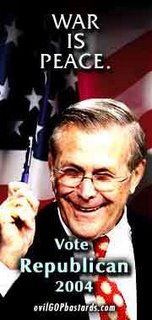 I guess terminal egomania would be the only explanation for the recent return to the national spotlight of Don (“The Former Defense Secretary We Had,” recalling that quote to Pitts and Wilson when they asked him about their armor, just as a reminder) by calling for (as noted here)…
I guess terminal egomania would be the only explanation for the recent return to the national spotlight of Don (“The Former Defense Secretary We Had,” recalling that quote to Pitts and Wilson when they asked him about their armor, just as a reminder) by calling for (as noted here)……a “21st-century agency for global communications.” Such an agency would respond to the media attacks leveled at the United States by Islamic radicals, using everything “from blogs to online social-networking sites to talk radio,” The Air Force Times said.The Times story also notes that Rummy envisions that this agency will “tell the story of a nation that was carved from the wilderness and conceived in freedom.”
Yeah, well, I don’t think any suicide bomber candidates in Mosul (like the one who perpetrated this) are going to be real receptive to hearing the Currier and Ives version of our country’s history, so I think that one is a “non-starter,” as they say.
And if Rummy is serious about trying to “win hearts and minds” in Iraq again (and let’s hope he isn’t), I also hope that he’s learned from some past mistakes, including these (noted here)…
In an effort to mask any connection with the military, the Pentagon had employed the Lincoln Group to translate and place (stories written by American troops in an effort to burnish the image of the U.S. mission in Iraq., translated into Arabic and published in Baghdad newspapers). When delivering the stories to media outlets in Baghdad, Lincoln's staff and subcontractors had sometimes posed as freelance reporters or advertising executives. The amounts paid ranged from $50 to $2,000 per story placed. All told, the Lincoln Group had planted more than one thousand stories in the Iraqi and Arab press. The U.S. Army also went directly into the journalism business itself, launching a publication called Baghdad Now, with articles written by some of its Iraqi translators, who received training in journalism from a sergeant in the First Armored Division's Public Affairs Office. The U.S. also founded and financed the Baghdad Press Club, ostensibly a gathering place for Iraqi journalists. In December 2005, however, it was revealed that the military had also been using the press club to pay journalists for writing stories favorable to the U.S. and the occupation. For each story they wrote and placed in an Iraqi newspaper, they received $25, or $45 if the story ran with photos.No amount of perfume is going to make the mess in Iraq any less of a pig, as the saying more or less goes, but this regime will never stop trying to pull these cheap antics even though a legitimate campaign to win over the locals is something that should have been conceived and executed before the first shot in the war was ever fired.
The planted stories were "basically factual," U.S. officials told the Los Angeles Times, although they admitted that they presented only one side of events and omitted information that might reflect poorly on the U.S. or Iraqi governments. Actually, though, concealing the fact that the stories were written and paid for by the United States was itself a form of deception. Concealment of sponsorship, in fact, is the very standard by which the U.S. Government Accountability Office defines propaganda. In a 1988 report that has served as a standard ever since, the GAO stated, "Our decisions have defined covert propaganda as materials such as editorials or other articles prepared by an agency or its contractors at the behest of the agency and circulated as the ostensible position of parties outside the agency. ... A critical element of covert propaganda is the concealment of the agency's role in sponsoring such material."
Well, at least if this proceeds somehow (only if privately funded – I don’t want to see a penny of our dough wasted on this), I hope Bushco puts someone in charge this time who at least speaks Arabic, unlike this person.
No comments:
Post a Comment